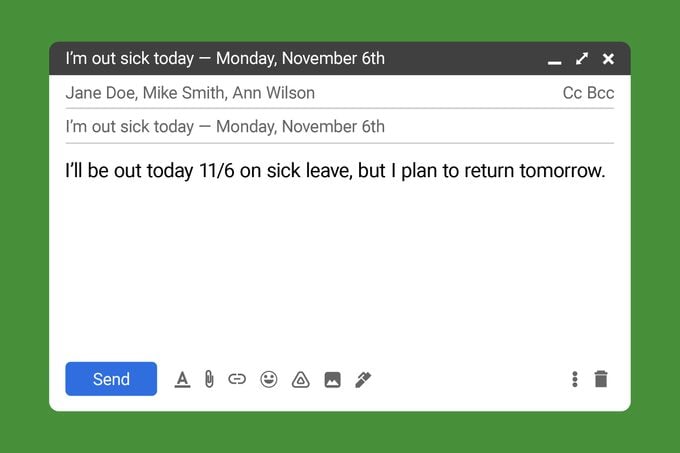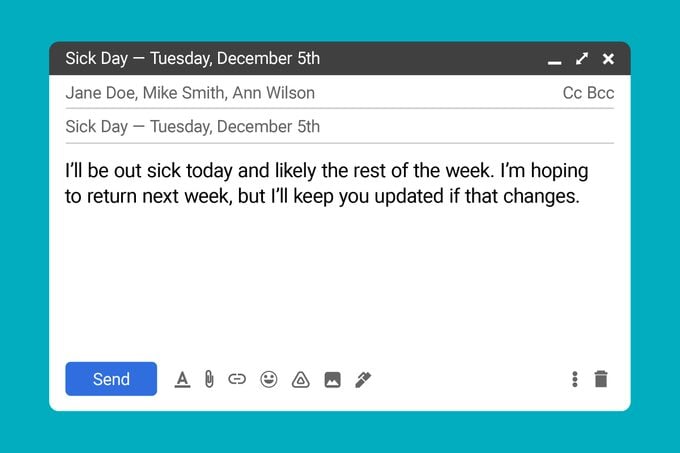How to Write a Sick-Day Email—Plus Templates to Use When You’re Under the Weather
Updated: Jan. 25, 2024

When you feel miserable, it’s hard to craft the perfect sick-day email. We’ve done the hard part for you, so all you have to do is copy, paste and fill in the blanks!
You wake up sick, and between trips to the bathroom, you remember that you need to let your boss know you won’t be coming in. Of course, then you have to figure out what to write in your sick-day email—while keeping in mind proper email etiquette and avoiding anything unprofessional. That’s a lot to handle when you’re already feeling foggy and unwell! Sigh … we live in complicated times.
But before you tackle that email, an important note: Don’t feel guilty about calling in sick. “You are human, and humans get sick from time to time—that’s normal and understandable,” says Alison Green, creator of the work advice site Ask a Manager and author of Ask a Manager: How to Navigate Clueless Colleagues, Lunch-Stealing Bosses, and the Rest of Your Life at Work. “You don’t need to apologize for that. What you do need to do, however, is let your boss know you’ll be out.”
And the sooner, the better. Proper business etiquette calls for you to send a professional, succinct and timely message as soon as you know you won’t be going into work. Here’s how to do it the right way, according to etiquette and career experts.
Get Reader’s Digest’s Read Up newsletter for more etiquette, career, humor, cleaning, travel, tech and fun facts all week long.
When should you send a sick-day email vs. phone in your absence?
Different companies have different protocols for sick-day notifications. For instance, some are OK with a text or Slack message, while others prefer a phone call, especially if they’ll need to find last-minute coverage for your absence. “But the gold standard is still the sick-day email,” says Jan Goss, a business etiquette expert and the founder of Show Up Well, an etiquette consulting agency. “Email is written, allows you to use spelling and grammar checks, is easily forwarded to others who may need the information and comes across as more formal or official.” Even if you do send off a quick text or leave a voicemail, you may still want to follow it up with an email, just to cover all your bases and have a paper trail in case questions come up later, she adds.
As for when to send a sick-day email, it’s a good idea to do so as soon as you know you’re getting sick and realize that you’ll be unable to work, Goss says. Many sick-day emails are sent fairly last minute—no one plans ahead to get really ill—but giving your boss 12 hours of notice is still better than two, so do it as soon as you can.
When does a sickness warrant a day off?
Severe illness or injury that makes you unable to physically perform your job duties is an automatic sick day, whether you work in an office or work from home. But if you’re not sure whether your illness is bad enough to warrant taking a sick day, use your best judgment, Goss says. For instance, she says to err on the side of safety if you work in an office and think you have something contagious like the stomach flu or COVID-19.
Is it OK to call in sick for a mental-health day?
This depends on how you define “mental-health day,” Green says. “Typically, ‘mental-health day’ is used to mean ‘I just can’t face going to work today, and I desperately need some time off,'” she explains. It’s fine to take the occasional sanity break, she notes, but don’t say you’re taking a mental-health day. “Handle it the way you would any other sick day, and just say you’re under the weather,” she says, adding that timing is everything. “Make sure you’re not picking a sick day when your absence will be a big burden on other people.”
However, if you are dealing with an actual mental-health issue, you should take a normal sick day, and you don’t need to clarify that it’s a mental illness instead of a physical one, Green says.
How to write a sick-day email

Rule No. 1 of writing a sick-day email is to just do it. Getting the motivation is the hardest part. “Don’t procrastinate!” Goss says. “That’s the top mistake I see people make when calling in sick.”
Writing the actual message—whether it’s for email, text message or Slack—is the easy part. Why? “The shorter and simpler, the better,” Green says. Here are nine tips from our experts to get you started and help you figure out what to say.
Write a short, informative subject line
Your subject should include the words “sick day” and the date, Goss says. For instance: “I’m out sick today — Monday, November 6th.” The key here? “Give them the pertinent information right in the subject line, before they even open the email.”
Copy others who need to know about your absence
Don’t send individual emails or rely solely on your boss to convey the message that you’re sick, Goss says. Under the subject line, cc or bcc anyone who will be affected by your absence, plus anyone else your company policy asks you to tell (for example, HR).
Keep it short and sweet
In this case, less is more. “Literally one line is fine!” Green says. (For examples of what to write, check out our templates below.)
Include any relevant details
“Depending on your job and the day, you might need to add one or two more lines to cover logistics,” Green says. For instance, you might want to note who will be covering for you or ask to reschedule a meeting.
Know that you don’t have to share what kind of sick you are
It’s not wrong to say something like “I have the flu” or “I’ve got a terrible migraine,” but think twice about sharing even that, Green says. “It’s better not to set a precedent of sharing the specific illness you have, because there may be a time when you prefer to keep that private,” she says. “It’s smart to get into the habit of keeping your private medical information private.”
Your boss and co-workers can and should accept your simple statement that you are ill, she says. The one exception, Goss adds, is if you were recently around other co-workers and you’ve discovered you have something highly contagious. Even then, spare them the gory details and instead stick to something like: “I have norovirus, and since we all ate lunch together yesterday, you might want to be on the lookout for symptoms too.”
Don’t go into detail about your symptoms
No one wants to hear about your explosive diarrhea or just how high your temperature is, yet some people feel compelled to include these details, as they think it lends legitimacy to their sick day, Goss says. You don’t need to do that. Most people will understand what “I’m ill” means—not to mention, it can be gross and, as a result, unprofessional.
Don’t tell others to reach out to you unless it’s absolutely necessary
Resist the urge to end your sick-day email with something like: “If you need to reach me, you can call me” or “I’ll still be reachable by email if you have questions.”
“If you’re taking a sick day, I hope you’re not working from home. That wouldn’t be a sick day—it would be a remote-work day!” Green says. “Ideally, people should truly disconnect when they’re out sick. It’s healthier for you as a person, and it’s healthier for your office culture.” But, she adds, if you’re going to check email once or twice, you can note that.
Skip the apologies and excuses
Getting sick is part of being human, and you don’t need to apologize for that, nor do you need to provide an excuse to use a sick day. “It’s fine to apologize once for the inconvenience,” Goss says, “but don’t feel guilty about using your sick days—that’s what they are there for.”
Give a time frame if you can
If your illness is such that you have a good idea of how long it will last, note that in your email, Goss says. For instance, you could include a line stating that you expect to recover over the weekend and be back in the office by Monday.
Sick-day email templates

Feeling a little foggy from lack of sleep and a dose or two of cough medicine? We’ve got you covered with these simple copy-and-paste sick-day emails that will cover any situation.
When you plan to be out for only a day or two
“I’ll be out today [insert date] on sick leave, but I plan to return tomorrow.”
When you’re sick but plan to work from home
“Hey, team. I’m feeling a little under the weather today, so I’m playing it safe and working from home. I’ll still be checking Slack and email a few times throughout the day if you need to reach me, and I’ll send out the project updates later today, as promised.”
When you’ve got a longer illness, like the flu or COVID
“I’ll be out sick today and likely the rest of the week. I’m hoping to return next week, but I’ll keep you updated if that changes.”
When you want to keep your condition private
“I’m taking today off as a personal day. I’ll see you guys on Monday!”
When you want to reassure others
“Hi, team! You’ve likely heard that I came down with a serious illness and was in the hospital. I appreciate your well wishes and look forward to returning when my doctors say I’m able to. In the meantime, contact [insert person] with questions.”
Out-of-office template for your sick day

Even if you’ll be out sick for just one day, it’s worth taking an extra minute to set an automatic out-of-office reply so people don’t wonder why they aren’t hearing back from you right away. No need to make it complicated or even say you are sick, Green says. Here’s an easy template to use for this purpose:
“I’m out of the office today, [insert date or date range]. If you need assistance sooner, please contact [insert name] at [insert email or phone].”
If you’re feeling humorous, try one of these funny out-of-office messages.
Send it!
A well-crafted sick-day email can be a very effective communication tool in business, and it doesn’t require Pulitzer Prize–winning writing skills. Bottom line? Write a short message, and send it as soon as possible. And nix any mention of what’s happening in your bathroom!
About the experts
- Alison Green is the creator of the work advice site Ask a Manager, where she routinely fields questions about sick days and more. She’s also the author of Ask a Manager: How to Navigate Clueless Colleagues, Lunch-Stealing Bosses, and the Rest of Your Life at Work and How to Get a Job: Secrets of a Hiring Manager.
- Jan Goss is the CEO and founder of Show Up Well consulting. She provides training in etiquette and leadership, focusing on a commonsense approach that blends protocol with kindness. She is also the author of two books, Protocol Power and Bedroom Etiquette.



